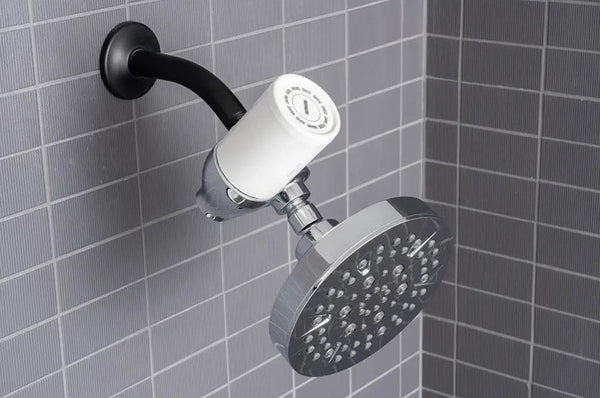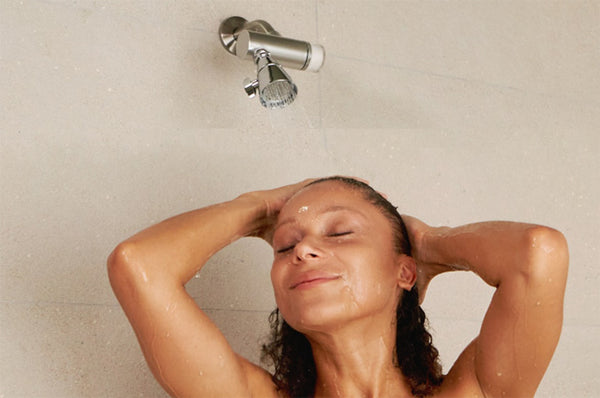
Does Shower Head Filter Really Prevent Hair Loss?
As living standards improve, people pay more and more attention to personal care and health awareness. Among them, the health of hair has become one of the focuses of much attention. Hard water, which is rich in minerals such as calcium and magnesium, is considered a common culprit in hair problems. Not only does hard water leave soap residue on your skin and hair, but it also requires more products to clean your hair and body. And filtered shower head is considered a perfect solution to hair loss problems caused by hard water. So, do shower head filters actually prevent hair loss caused by hard water? How does a shower head filter work? Let us take the questions into the discussion of the following article!

What is a Shower Head Filter?
Shower head filter is a device installed on the shower equipment, mainly used to improve and filter impurities entering the shower water. The aim is to improve water quality and reduce potential harm to skin, hair and overall health. These filters usually contain a variety of filter media, such as FKD 55, Calcium Sulfite, Activated Carbon, Ceramic Balls, etc., to effectively remove pollutants in the water, such as chlorine, heavy metals, bacteria, etc., thereby providing a cleaner, softer shower experience. Shower head filters are designed to provide users with a healthier and more comfortable bathing environment, reducing skin problems and hair damage related to water quality.
How Does a Shower Head Filter Work?
Shower head filters work by effectively removing impurities and harmful substances from shower water through the filter media inside them, such as chlorine, heavy metals, sediment and sometimes even bacteria, thereby improving water quality and providing a more refreshing and gentle shower experience while hopefully mitigating the negative effects of hard water on hair and skin. Here are the main working principles of filtered shower head:
Filter Media:
Shower head filters are usually composed of a variety of filter media, including but not limited to KDF 55, Calcium Sulfite, Activated Carbon, Ceramic Balls and Minerals. The specific media selection depends on the design of the filter and the technical solutions of the manufacturer. KDF 55 is mainly used to remove chlorine and heavy metals from water and inhibit bacterial growth to ensure water quality safety; Calcium Sulfite is highly efficient in removing chlorine and other harmful chemicals, especially in high temperature environments. Activated carbon is used to absorb odors and organic matter, while ceramic balls can filter tiny particles to further improve the purity of water quality.
Physical Filtration:
Some shower filters use physical filtration to filter out larger particles, sediments and impurities in the water by setting micropores or meshes. This helps block particulate matter that is harmful to your hair and skin.

Benefits of Shower Head Filters for Hair
The benefits of filtered shower head for hair are mainly reflected in improving water quality and reducing the impact of harmful substances, thus promoting hair health. Here are some of the positive effects of shower filters on hair:
1. Reduce the effects of hard water:
Shower filters can effectively reduce hard water components in the water, such as calcium, magnesium and other minerals. Hard water can make hair rough, dry, and prone to breakage, and using a filter can help reduce these negative effects and improve hair texture.
2. Remove chlorine and chemicals:
Tap water in many areas contains chlorine, which is a strong oxidant and can cause damage to hair. Shower filters can effectively remove chlorine molecules from the water and reduce chlorine irritation on your hair. Additionally, the filter reduces the effects of other chemicals, making hair healthier.
3. Protects natural oils:
Hard water and chemicals in the water can cause hair to lose its natural oils, leaving it dry and brittle. Shower filters help retain your hair's natural oils, leaving your hair shinier and softer.
4. Reduces the risk of hair loss:
By reducing the level of hair damage, shower filters are expected to reduce hair loss. The reduction of hard water and harmful substances will help maintain the healthy condition of your hair and slow down the hair loss process.
5. Scalp soothing:
Some filter designs help reduce scalp dryness and irritation, providing a gentler shampooing experience. This is beneficial for the overall health of your hair and scalp.
Overall, water filter for shower heads help maintain hair's shine, softness, and overall health by improving water quality and reducing adverse effects on hair, providing a gentler, healthier shampooing environment.
A study conducted by Dermatology Institute found that participants who used shower head filters experienced significantly less hair loss over time than those who did not. This suggests that shower head filters do have some promise in mitigating the negative effects of hard water on your hair. To verify how effective shower filters actually are, we conducted an experiment. The experimental group had filters installed in their showers, while the control group had regular showers. The experiment lasted for two months, and we recorded the participants' hair quality, gloss, and hair loss. The results showed that in the experimental group, participants who used filtered shower head had improved hair quality, increased gloss, and reduced hair loss compared to the control group. This is further evidence of the positive effects of shower filters in mitigating the negative effects of hard water on your hair.
Other Benefits of Shower Head Filters
In addition to their hair benefits, shower head filters have a range of other positive benefits involving skin health, respiratory system, and the overall shower experience. Here are some additional benefits of water filter for shower heads:
1. Skin moisturization:
Shower filters help remove chlorine and other chemicals from the water, reducing skin irritation. This helps maintain the skin's natural moisture and reduces the likelihood of dry and dehydrated skin.
2. Reduce allergic reactions:
Filters are able to remove some allergens from water, such as allergen particles, bacteria, and other microorganisms. This helps reduce allergic reactions to the skin, especially for people with sensitive skin.
3. Respiratory protection:
Some water filter for shower heads are designed to remove aerosol particles from water that may be linked to respiratory conditions like asthma and bronchitis. Using a filter may help reduce the occurrence of respiratory problems.
4. Improve the shower experience:
Remove odors, impurities and particulate matter from the water, making the water more refreshing and improving the comfort and texture of the shower. This helps create a more pleasant bathing environment.
5. Prevent skin problems:
Harmful substances and pollutants in water can cause skin problems such as eczema and acne. Water softener shower heads promise to alleviate these problems and protect skin health.
6. Extends pipe life:
Filters prevent particulate matter from the water from entering pipes, slowing the formation of scale and helping to extend the life of shower systems and water pipes.

Conclusion
Shower head filters present significant benefits when it comes to hair care and overall health. By reducing the effects of hard water and removing harmful substances and contaminants, shower filters provide users with a cleaner, softer shower experience. After discussing how shower filters work and their benefits for hair, we can conclude that using a filtered shower head has the potential to reduce the negative effects of hard water on your hair, improve hair quality, and reduce the likelihood of hair loss.
The study results support the actual effectiveness of shower filters, with participants experiencing a significant reduction in hair loss over time. Over a two-month experiment, participants who used shower head filters showed improved hair quality and reduced hair loss, providing more visual evidence of the positive effects of shower filters in hard water protection.
Plus, shower head filters not only help with hair health, they also offer added benefits in terms of skin hydration, allergy reduction, respiratory protection, and more. These combined benefits make a shower filter more than just a beauty product, but an important device for overall health.
In terms of replacement frequency, based on comprehensive considerations such as water quality, frequency of use, filter type and other factors, it is usually recommended to replace the shower filter between 3-6 months to ensure that it always maintains efficient filtration.
Therefore, the actual effectiveness and combined benefits of shower filters show that they are a reliable choice for promoting healthy hair and enhancing the showering experience, making a positive contribution to personal care and health awareness.
FAQ About Shower Head Filter
Q: Can chlorine in water cause hair loss?
A: Chlorine in water is not the direct cause of hair loss. However, it strips the hair and scalp of their natural oils, causing dryness and damage. Some people with sensitive skin or hair may experience irritation, which can indirectly lead to hair problems.
Q: What types of impurities do filtered showerheads typically remove?
A: Filtered shower heads are designed to reduce impurities such as chlorine, heavy metals and minerals in the water. The specific filtration mechanism varies by brand and model, but common filter materials include calcium sulfite, activated carbon and KDF (Kinetic Degradation Flow).
Q: Can hard water cause hair loss? Can a filtered shower head help?
A: Hard water contains high amounts of minerals, which can cause problems such as dryness and breakage of hair. Filtered shower heads can help mitigate the effects of hard water by reducing mineral deposits, potentially improving the texture and appearance of your hair.
Q: What are the potential benefits for your hair of using a filtered shower head?
A: Filtered shower heads reduce exposure to harsh chemicals and minerals in the water, resulting in healthier hair. This can make hair softer and more manageable, especially for people who are sensitive to water impurities.
Q: Are there any disadvantages to using a filtered shower head?
A: While filtered shower heads can improve water quality, they may have limitations in completely removing all impurities. Additionally, filters need to be replaced regularly, which increases maintenance costs.
Q: Can a filtered shower head help with other hair-related problems, such as dry scalp or dandruff?
A: A filtered shower head can help keep your scalp healthy by reducing exposure to potentially irritating substances in the water. However, the effectiveness of addressing specific scalp conditions may vary, and individual responses may vary.
Q: If I'm experiencing hair loss, should I consult a professional, or can a filtered shower head be a stand-alone solution?
A: Hair loss can have a variety of causes, including genetics, hormonal changes and medical conditions. If you are experiencing severe hair loss, it is recommended to consult a healthcare professional or dermatologist to determine the underlying cause and appropriate treatment. A filtered shower head can be part of an overall hair care approach, but may not be a stand-alone solution for everyone.
Q: Are shower filters easy to install?
A: Most online (like the ones tested above) are very easy to install. Generally speaking, you just unscrew your current shower head, add Teflon tape to help prevent leaks, screw on the new filter, and then screw the original shower head onto the new shower filter. Most filters come with Teflon tape, and the only tool you may need is a channel lock or a pair of pliers to loosen and tighten the filter shower head.
Q: How often should I change my shower head filter?
A: Shower head filters typically have a lifespan of 3 months to 6 months. The replacement cycle will also be affected by how often the shower is run. If you have a family of five who bathe every day, you will most likely need to change the filter before the recommended time frame. Because my water has high chlorine levels, I can usually tell when it needs to be changed by how the water feels on my skin. When the filter life is running out, the water starts giving me a burning sensation.
Q: How much does it cost to replace a shower head filter?
A: Filter replacement prices will vary for different types and brands of shower filters. For the example above, the cost to replace a filter ranges from $10 to $50, and the life span ranges from 3 months to 12 months. If you like your filters, I recommend checking out if there are discounted prices for purchasing multiple replacement filters at once.
Q: Are shower filters compatible with all shower heads?
A: Of all the inline shower filters we review and test, our standard shower heads fit them all. The standard size for shower lines is 1/2 inch, so all shower filters and shower heads should be the same. You should have no problem screwing your existing shower head onto the filter.
Q: Will a shower head filter affect water pressure?
A: Shower head filters will not affect water pressure if installed and replaced at appropriate intervals. The only known way this would happen is if your water is heavily contaminated, causing the filter to fill up and slowing down the cleaning process. But if you change your filter regularly, you won't notice this.
Make sure your shower filter matches or exceeds your shower head flow rate. Most filters and shower heads are rated for 2.5, 2.0, 1.8, and 1.5 gallons per minute. If you put a 1.5 GPM shower head over a 2.5 GMP shower filter, the water flow may be slower than expected, but that's because the shower head is designed to slow down the water flow.
Q: Do shower head filters require maintenance?
A: Once installed, the only maintenance is to replace the filter when needed. If any leaks are discovered after replacement, you may need to add or replace Teflon tape until the leaks stop.
Q: Are shower head filters affordable?
A: Like everything, you get what you pay for, but we found some cheap options (around $30) that you'll notice a noticeable difference in. If the water you test has very high levels of chlorine or heavy metals, we recommend purchasing a mid- to high-end shower filter for your safety.
Q: How often should I test my water?
A: Whether you are using well water or municipal water, you should test your water at least once a year. If you have a municipal water supply, your municipality will regularly test the quality of its water. Residents can usually easily find test results online. However, if you are using well water, testing is primarily the homeowner's responsibility. There are no hard and fast requirements in the law books that dictate how often water testing needs to be completed. Generally speaking, the only time you need to test your well water is when you first dig the well and replace the pump.
Join Our VIP Gourp

Here we will do:
- Provide good after-sales service;
- Do giveaway activities every once in a while;
- You will have the opportunity to experience new products for free;
- We will select people who share good pictures or videos and give them a gift for free.
- Get the latest news of Bostingner, such as discounts, clearance, new product releases, tips, etc.
- Want to join us? Clik this link: Join Bostingner VIP Group



Leave a comment